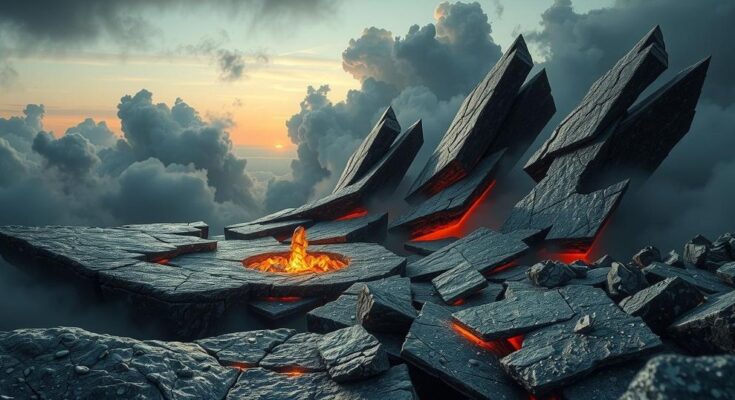The Alliance Fleuve Congo (AFC) has captured Goma, escalating violence in the DRC’s eastern region and exacerbating a humanitarian crisis. The government accuses Rwanda of supporting the M23 rebels, leading to casualties among peacekeepers and civilians alike. Nationwide protests erupt, and escalation fears grow as regional tensions rise, highlighting the ongoing struggle for control over vital mineral resources.
A rebel alliance has seized control of Goma, the largest city in the mineral-rich eastern region of the Democratic Republic of Congo (DRC), amidst resistance from government forces and international peacekeepers. The Alliance Fleuve Congo (AFC), which includes the M23 group, has expanded its territorial claims following earlier conquests of surrounding towns. This territorial expansion exacerbates an already dire humanitarian crisis as thousands flee the conflict zones.
The Congolese government has yet to officially confirm the capture of Goma but acknowledges the presence of rebels in the city and has severed diplomatic ties with Rwanda, accused of supporting the M23 group. The violence has led to the deaths of various foreign peacekeepers, with hospitals overwhelmed as civilians search for medical assistance.
Fighting has escalated, leading to turmoil in Goma, including reports of civilian casualties, sexual violence committed by fighters, and extensive looting. The situation has sparked nationwide protests, with demonstrators targeting foreign embassies, rallying against foreign involvement in the conflict. The security threat has intensified, with firefights reported along the Rwandan border as tensions rise.
The M23 group claims to protect Rwandophone communities, including Tutsis, and has recently intensified its military efforts since regaining strength in 2022. Control over lucrative mineral resources, particularly coltan, has been a key factor in the rising violence, as these resources significantly contribute to global supply chains.
Goma’s strategic importance lies in its population, international airport, and proximity to Rwanda, posing concerns for regional stability. M23’s claims of liberation are marred by historical human rights violations, with many civilians displaced by ongoing hostilities, further straining humanitarian resources.
Rwanda’s involvement has sparked backlash from the international community, describing its support for M23 as a significant threat to regional peace. The situation deteriorates as both the DRC and Rwanda remain poised for conflict, complicating pathways to peace in the region.
The Democratic Republic of Congo (DRC) faces profound challenges stemming from decades of militia violence, largely exacerbated by ongoing conflicts over natural resources in its eastern regions. The M23 rebel group, which rose significantly in recent years, is intertwined in regional dynamics, often linked to Rwanda’s military actions. As the DRC struggles with internal stability, the interplay of foreign involvement and local grievances creates a complex landscape of conflict and human suffering, particularly in resource-rich areas like Goma.
The situation in Goma underscores a critical intersection of conflict and humanitarian disaster in the DRC, compounded by international and regional dynamics. As violence escalates, the plight of civilians deepens, prompting urgent calls for dialogue and resolution. The international community remains concerned about the strategic and humanitarian implications of M23’s activities in the region, highlighting the need for a multifaceted approach to restore peace and stability in Eastern Africa.
Original Source: www.cnn.com




